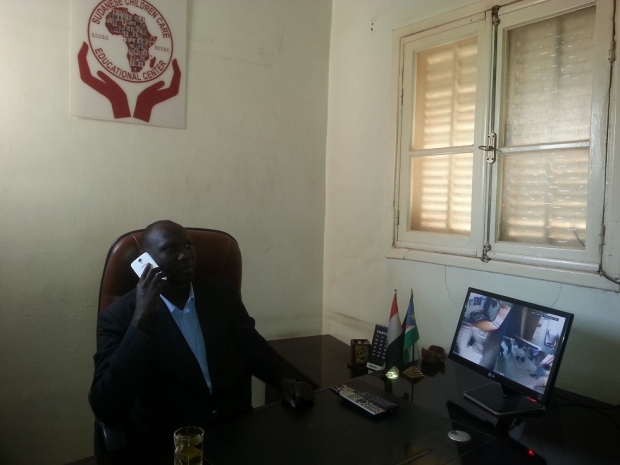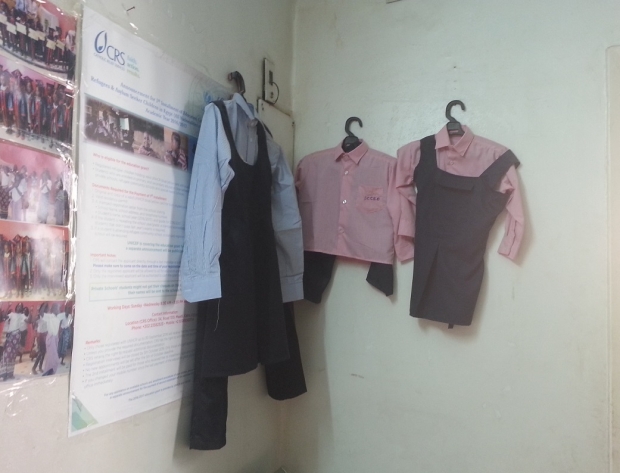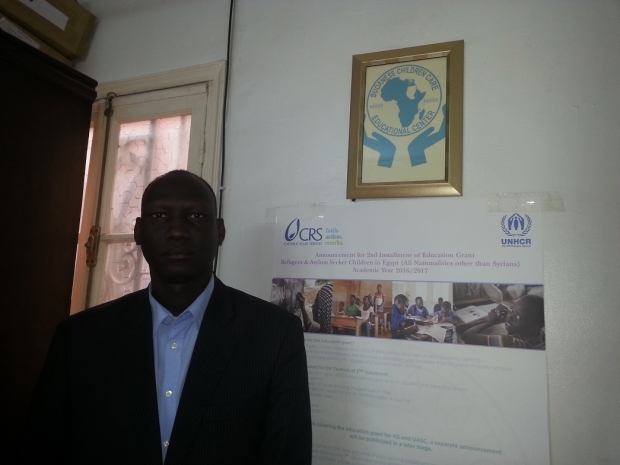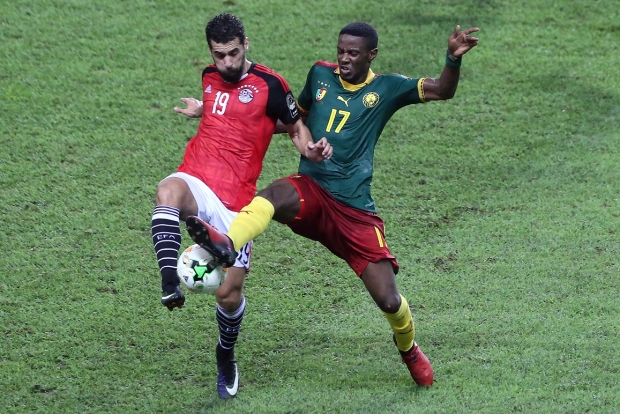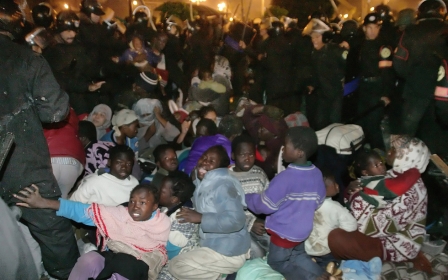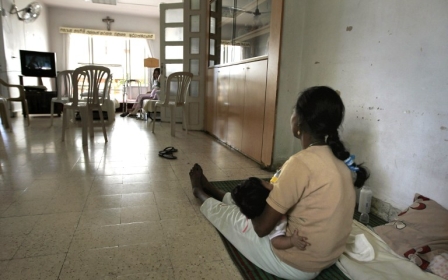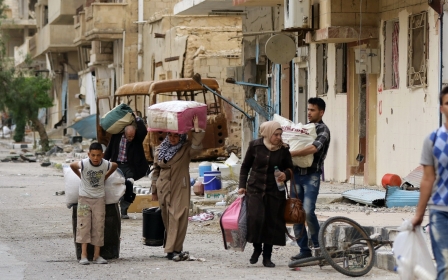When they call you 'Negro': Egypt’s Sudanese are prisoners of racism
CAIRO - “You are dogs, animals, [you’re not even] human,” Emad Hamdy, an Egyptian shop owner yelled out as he stormed into an education centre for Sudanese children in the Ain Shams district north of Cairo, according to the centre's principal, Marko Deng.
Deng recalled the dreadful February day that his Sudanese friend and volunteer teacher, 50-year-old Gabriel Tut, was killed at the hands of Hamdy, simply for the colour of his skin, according to his colleagues.
'I lost my friend only because of his colour. The killer wants no black people in Egypt'
- Marko Deng, school principal
"I lost my friend only because of his colour. The killer wants no black people in Egypt," Deng said.
Deng didn't witness the incident himself, but he reviewed the crime on the education centre's surveillance footage, which was later submitted to the authorities.
Hamdy was convinced to leave the school's premises with the help of a neighbour, but he returned carrying a metal rod. As Tut was walking out of the education centre, Hamdy beat him on the head with the metal rod before he fled the scene.
“The street was full of [Tut's] blood. We carried him to the hospital, but he died before we arrived there,” Deng said. "[Gabriel] was a good man, full of love. Everyone loved him whether they were Sudanese or not. He was a better man than me."
Tut left behind his wife and two boys. They had moved from Sudan to Egypt in 2005.
Deng said that Hamdy harassed the school's staff and students and insulted them on a daily basis because they are "Sudanese and black," adding that he used to regularly unleash his dogs on the children at the end of the school day.
'[Gabriel] was a good man, full of love. Everyone loved him whether they were Sudanese or not'
- Marko Deng, school principal
The day of the incident, the school's gate was left open so Hamdy took the opportunity to enter the centre's premises and harass the staff and the children.
“The incident is a natural result of the daily racism against all dark-skinned people in Egypt,” Deng said.
The perpetrator was arrested the same day. He is accused of murder and is now under pre-trial detention. Hamdy admitted his crime and did not show any sign of remorse while he was being detained, according to Deng.
Out of fear for their safety or any sort of reprisal, shortly after the incident Tut’s family left the district of Ain Shams and has refused to speak to media ever since.
'Brothers from one continent'
In addition to being a principal, Deng is also a south Sudanese priest and a member of the Sudanese Anglican Church of Egypt. When civil war broke out in his native land, he fled to Egypt in the year 2000.
'Some people are prisoners to a racist culture that is inherited from one generation to another'
- Abdel Latif Farouk, political researcher and specialist in African affairs
“Other countries such as Kenya, Ethiopia, Uganda and Congo were close to me... but we decided to come to Egypt as we love it,” he said.
However, the love he has for the country could not shield them from racism.
“Some children stop us [on the street] and say you have darkened the country or you are monkeys,” he said.
“I do not know why some people don't consider us brothers from one continent; why they tell us you have plagued the country, while on the other hand, they welcome the Syrians and help them,” he added.
'I do not know why some people don't consider us brothers from one continent; why they tell us you have plagued the country, while on the other hand, they welcome the Syrians and help them'
- Marko Deng, school principal
Since the war in Syria broke out in 2011, Egypt has become host to 100,000 Syrian refugees, according to estimates by Sudan’s commission of refugees.
An official in the interior ministry, who preferred to remain anonymous because he was not permitted to talk to the media, told MEE that “Egypt is committed to protecting and securing all its guests whatever their nationalities are.”
“We will take all legal procedures against whoever commits any violations against our guests,” he firmly added.
According to the spokesperson of the United Nations High Commissioner for Refugees (UNHCR), as of February 2017, Egypt is home to 202,209 refugees and asylum seekers.
These figures include 82,055 sub-Saharan Africans of which 34,671 are Sudanese, Tariq Argaz, UNHCR spokesman, told MEE.
According to Argaz, there have been complaints from the Sudanese and Ethiopian communities where they have been victims of verbal insults, but he referred to them as “individual practices [and] not systematic ones”.
On the other hand, Abdel Latif Farouk, a political researcher who specialises in African affairs, said incidents such as these are to be blamed on the “the legacy of racism some people live with”.
“Some people are prisoners to a racist culture that is inherited from one generation to another. We will get rid of this only with better education and awareness,” Farouk added.
‘They were all laughing at our pain’
Yet there have been more brutal instances of violence. Back in March, Sudanese law student Louis Ajok faced a vicious dog attack that left him emotionally and physically scarred.
“We were screaming in pain, asking for help from bystanders but nobody cared,” Ajok told MEE, in his house in the Cairo suburb of Maadi.
There was a consensus of laughter among the crowd as they watched the attack unfold. “They all laughed at our pain and suffering,” he added.
'The whole street, about 30 people, were watching us crying from the dogs and begging for help, but no one did us justice or saved us'
- Louis Ajok, Sudanese law student
Ajok has been studying law at Cairo University for three years and lives with four other fellow Sudanese students. Though he had experienced racist slurs and ridicule in the past, what happened to him on 24 March was something he had never expected.
In recalling the events of the day, he explained that he and four of his friends had been watching a football game in a cafe in Maadi. They spotted five youths who were playing with at least two dogs. According to Ajok, one of them had control over the dogs that were tied to chain leashes.
“They started insulting us saying, 'Sons of dirt [and] sons of a bitch,' and then the guy decided to let the dog run towards us,” he said, while revealing the bite marks on his thigh.
“The whole street, about 30 people, were watching us crying from the dogs and begging for help, but no one did us justice or saved us," he added.
Ajok said he was used to being insulted and called 'zingy' in Arabic, which translates into 'negro'.
“Sometimes the microbus driver would call us negroes, or even refuse to give us a ride; a lady once threw a diaper at me,” he said.
'Sometimes the microbus driver would call us negroes, or even refuse to give us a ride'
- Louis Ajok, law student
During the Africa Cup of Nations in February, Ajok said his life turned into a nightmare, due to the fact that the Egyptian team was competing against an African one.
“People consider us Africans in general, it doesn’t matter if we are Sudanese when they lose to Ghanaians. We are all black,” he said.
“When we approached the end of the match with Egypt behind Cameroon with one goal, we decided to leave [the cafe],” he said.
“People around us were staring [angrily] at us with every goal [Egypt] missed,” he added.
‘We are Arabs not Africans’
When Egypt was under the rule of late president Gamal Abdel Nasser, Africa was at the heart of Egyptian diplomacy. Sudan specifically was under joint British-Egyptian rule from 1899 until it gained its independence in 1956.
In 1963, Egypt was a founding member of the Organisation of African Unity, which later evolved to become the African Union.
With the passage of time, however, its affiliation with Africa dwindled and the way Egyptians perceived themselves changed as a result.
'We [Egyptians] are Arabs. I don’t know anything about Africa'
- Mahmoud, high school student
Back in Maadi, 16-year-old high school student Mahmoud, who preferred to not reveal his last name, sees himself as an Arab.
“We [Egyptians] are Arabs. I don’t know anything about Africa,” he said.
He casually referred to his African neighbours with the "black faces" as “negroes,” as two African women crossed the road near his school, amid the approval of fellow students standing with him.
New MEE newsletter: Jerusalem Dispatch
Sign up to get the latest insights and analysis on Israel-Palestine, alongside Turkey Unpacked and other MEE newsletters
Middle East Eye delivers independent and unrivalled coverage and analysis of the Middle East, North Africa and beyond. To learn more about republishing this content and the associated fees, please fill out this form. More about MEE can be found here.


